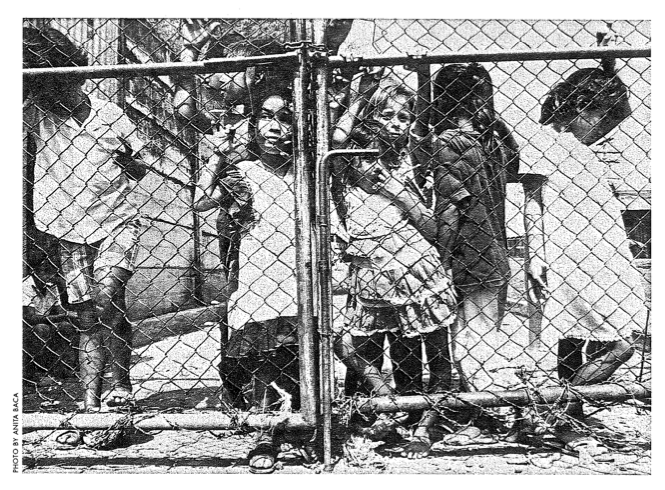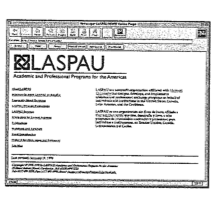The Global Internet
Privacy, Security, and Civil Liberties

Fencing them out? Information policy can lead to sustainable economic growth.
In Nicaragua, Julie Noble, a U.S. relief worker, was expelled because of an e-mail message she sent criticizing President Arnoldo Aleman’s handling of aid for victims of Hurricane Mitch.
In Venezuela, campaign opponents were accused of inappropriately using the Internet and e-mail in Hugo Chavez’ recent successful presidential bid.
Such incidents throughout Latin America and the world put the spotlight on the Internet and issues of security, privacy, and civil liberties.
-JCE
The issues of privacy and information security are often treated as new ones, but the development of measures for the protection of personal data and privacy and the security of information systems are more than two decades old. A lot of work has already been done at international and national levels to establish common principles and rules.
The current challenges are the dissemination of the international and National frameworks that already exist. New measures and practices may be developed as necessary to meet security and privacy requirements.
There is a deep human need to communicate . It is a profound characteristic of our species. We will go to great efforts to do so, from making clay tablets and digging cuneiform into them, repeatedly dipping a quill into ink and scratching it on parchment, to the age of computer technologies and beyond.
For most of mankind’s existence, communication was, of necessity, evanescent. Now, and into the future, as more and more interactions take place over various information media, a greater proportion of communications are, and will be, recorded and recordable. They will be more durable and much easier to duplicate and distribute than ever before. The Global Information Infrastructure is a tool for our communication with one another. It is important to bear this in mind and develop human-centered systems and policies for the Global Information Society.
Coupled with our zeal to communicate is the equally strong desire, at times, to limit the audience for our conversation. Conversations with a spouse, with a boss about a new company strategy, with a co-worker about a boss, or with a colleague about some government policy are all fine communications, with nothing inherently wrong or embarrassing about them. At the same time, we do not want everyone to hear them.
Information technologies provide many potential benefits, but it is important also to ensure that communications systems are not made too transparent and to preserve zones that permit individuals to engage in all the great variety of human discourse. The current, vivid debates about privacy and personal data protection and cryptography arise from this problem.
While there is a lot of good news with regard to information and communication technologies-general improvements in terms of speed, cost and other factors, and their potential economic and social benefits-there is also some bad news. Intrinsic security is growing worse. There are more computers, more networks, more data and information, and, most significantly, more fallible human beings connected to and using the systems.
Two equally strong, diverging trends may be discerned in the present debate. They are increasing treatment of personal data as property and growing consideration of protection of privacy and personal data as a fundamental human right. Under the property analysis, the personal data becomes commoditized. The individual claims the value of their personal data and bargains for remuneration in return for its use or disclosure.
In treating privacy and personal data protection as fundamental human rights, they are categorized as inalienable, in the same manner that the right to vote may not be traded or organs may not be sold. The operative notion is that personal information is so intimately bound up with individual integrity and autonomy that it should not be permissible to bargain it away.
Neither of these trends has prevailed, and the debate is still heating up. I favor the human rights view of privacy and personal data protection for the Global Information Infrastructure.
The underlying issue for privacy and security is: “Who gets to speak and decide on these issues?”
We already know a lot about security and privacy, but are not implementing it sufficiently. We need to work toward a global consensus with regard to business practices, law, norms and regimes for security of information systems, privacy and personal data protection.
Winter 1999
Deborah Hurley is the Director of the Harvard Information Infrastructure Project. She worked for many years in Paris for the Organization for Economic Cooperation and Development on issues of privacy, cryptography, security of information systems, and intellectual property protection.
Related Articles
LASPAU New Directions
Since the advent of the computer, the ratio of cost to processing speed has doubled every 18 months, resulting in equipment that is increasingly powerful and affordable. This exponential…
LASA and the Internet
When I began my term as president of the Latin American Studies Association one of my priorities was to explore ways for LASA to make better use of electronic resources. I also wanted…
Internet Commerce
When you think about doing business over the Internet, you usually think about large enterprises like the popular online bookstore www.amazon.com , located in First World…




